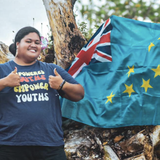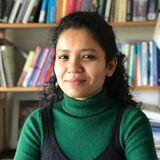As global temperatures rise, so does the influence of right-wing parties in the West, driven by calls for stricter migration policies and border controls. Those currently seeking asylum already face Europe’s deadly borders. But what about climate refugees? They are not recognised under the UN Refugee Convention and therefore have no legal basis to seek asylum in Europe. Meanwhile, it is widely believed that climate change could displace over 140 million people by 2050, with prominent headlines warning that migration could become the greatest climate challenge of our time. While this alarmist narrative dominates the media, it oversimplifies the far more complex and diverse relationship between climate change and migration. Where does this dominant narrative come from and what are its implications? How exactly are climate change and migration related? How does the representation of climate refugees relate to racism and neo-colonialism? And how will ongoing climate impacts affect global migration in the future? This evening aims to go beyond the mainstream narrative and delve into the complicated realities of climate migration, by uncovering the facts, dispelling the myths and exploring possible future scenarios in today’s political climate.





Ingrid Boas is professor in Climate Mobilities at the Environmental Policy Group at Wageningen University & Research. Her research is based in the fields of environmental change, mobilities, and governance, and is specialised in the subject of climate change-related mobility and immobility. Currently, her focus is to further study the political and power dimensions of climate (im)mobilities.
Lilly Teafa is from the large ocean state of Tuvalu. She is the Communications Officer for the Tuvalu Family Health Association (TuFHA) and an advocate for climate justice, women, youth and the LGBTQ+ community. As a climate justice advocate, Lilly represents her country at international conferences, such as the COP28 in 2023, organises trainings and activities for youth, and is involved in youth-led organisations that focus on coral restoration and other environmental projects. She is also involved in women’s empowerment programmes focusing on the role of women in communities and politics, on violence against women, and on their sexual rights.
Shivant Jhagroe is professor at Leiden University where he researches the politics of sustainable transitions and climate policy, focusing specifically on inequality and equity. In his new book Beyond Sustainability (Voorbij Duurzaamheid), he takes a critical look at the dark side of sustainability. He shows how it is intertwined with colonialism, capitalism and social exclusion, making also a link to those made climate refugees.
Madhurima Majumder is a PhD researcher at Wageningen University & Research and a feminist ethnographer who studies environmental governance and human mobility in deltaic and coastal areas, particularly in India and Bangladesh. She studies the relationship between poor governance and climate change-related mobility. Besides that, she explores the historical colonial past of the deltaic and coastal spaces and its impact on the present.
Michele Dalla Fontana is a Marie Skłodowska-Curie Postdoctoral Fellow at Wageningen University & Research. He is currently conducting research on human mobility and climate change in the European context, with a specific focus on Portugal. His research explores local experiences and practices of environmental change and mobility, and how they are embedded in power dynamics.






